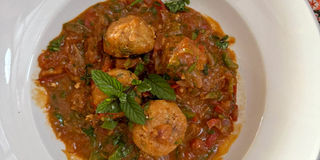Biz Lounge: I left balance sheets for fish treats

James Maina poses for a photo during the interview on 9th April, 2025.
James Maina is a passionate food and book lover on a mission to make fish accessible and enjoyable for babies, toddlers, and the elderly, by processing it in a way that eliminates fish bones.
His love for food runs deep—so much so that his Instagram feed is dominated by food photos and reels, with only a few glimpses of his family life.
"I love food. I don’t just enjoy eating—I love preparing it too. In fact, it’s been five years since my wife last cooked," he laughs. "That passion is what drives my business."
Maina's journey started after leaving a job as an accountant in an auditor firm. With an investment of Sh180,000 and a few friends, he ventured into fish and vegetable farming—crops in Nyandarua and fish farming in Lanet, which he managed.
While training farmers on how to raise fish in small spaces, Maina noticed a recurring challenge: a lack of market for the harvested fish. This inspired him to start processing fish to not only help farmers sell their produce but also realize his own vision.
“I saw an opportunity to meet the needs of young children, the elderly, and babies while addressing the market gap for farmers. That’s how Green Thumb Fish N Buns was born,” he explains.
He later received training in fish processing at the National Aquaculture Research Development and Training Centre (NARDTC) in Sagana, which helped him refine his concept.
Introducing his fish-based products to the market wasn’t difficult, he says, as there was nothing quite like it. That first sale gave him the confidence to keep going.
Today, Green Thumb offers products like fish balls, sausages, samosas, and fish burger patties—with a fish soup mix currently in development.

Fish balls prepared by Green Thumb Fish N Buns founder James Maina on 9th April, 2025.
“Parents love our products because they’re easy to prepare and packed with nutrition—perfect for kids,” Maina says.
He sells the fish balls at Sh. 400 a dozen, sausages at Sh. 900 per kilo, samosas at Sh. 300 for five pieces, and fish burger patty at Sh. 450 for four pieces.
The fish balls and patties are sold precooked, while the samosas and sausages come raw.
Over the years, Maina has invested in improving product quality through research, employee training, and product diversification. He's also received grants and partnered with various organizations that have supported the growth of his business.
“These partnerships have been key. I always tell young entrepreneurs—position yourself well to attract the right partners. It’s like making friends—you need shared values and complementary strengths,” he advises.
Looking ahead, Maina hopes to build a lasting legacy with his business.
“It’s important to empower your team. Many entrepreneurs fear that, but it actually strengthens your business. My five employees are constantly upgrading their skills, which helps reduce mistakes and ensures the business runs professionally.”
He also dreams of opening a physical outlet to make his products more accessible, as he currently operates on a delivery-only model.
Finally, Maina urges the county government to support local start-ups, emphasizing their potential to create meaningful employment for the youth.


